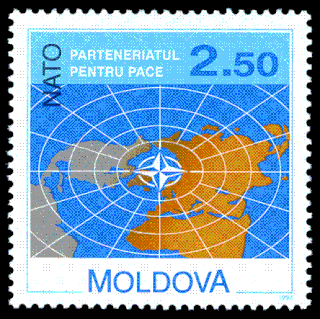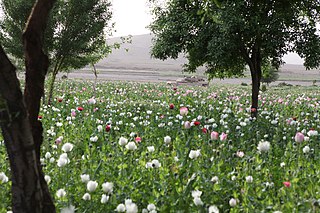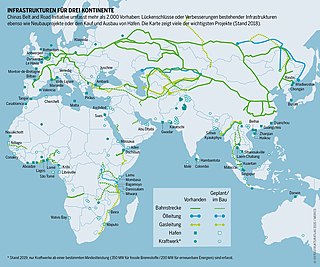Related Research Articles

Central Asia is a subregion of Asia that stretches from the Caspian Sea in the west to China and Mongolia in the east, and from Afghanistan and Iran in the south to Russia in the north. It consists of the former Soviet republics of Kazakhstan, Kyrgyzstan, Tajikistan, Turkmenistan, and Uzbekistan, and is colloquially referred to as "The -Stans" as the countries all have names ending with the Persian suffix "-stan", meaning "land of".

Tajikistan, officially the Republic of Tajikistan, is a landlocked country in Central Asia. It has an area of 143,100 km2 (55,300 sq mi) and an estimated population of 9,749,625 people. Its capital and largest city is Dushanbe. It is bordered by Afghanistan to the south, Uzbekistan to the west, Kyrgyzstan to the north, and China to the east. It is separated narrowly from Pakistan by Afghanistan's Wakhan Corridor. The traditional homelands of the Tajiks include present-day Tajikistan as well as parts of Afghanistan and Uzbekistan.

The Shanghai Cooperation Organisation (SCO) is a Eurasian political, economic and security organization. In terms of geographic scope and population, it is the world's largest regional organization, covering approximately 60% of the area of Eurasia, 40% of the world population, and more than 30% of global GDP.

Plan Colombia was a United States foreign aid, military aid, and diplomatic initiative aimed at combating Colombian drug cartels and left-wing insurgent groups in Colombia. The plan was originally conceived in 1999 by the administrations of Colombian President Andrés Pastrana and U.S. President Bill Clinton, and signed into law in the United States in 2000.

The Partnership for Peace (PfP) is a North Atlantic Treaty Organization (NATO) program aimed at creating trust between the member states of NATO and other states in Europe, including post-Soviet states; 20 states are members. The program contains six areas of cooperation, which aims to build relationships with partners through military-to-military cooperation on training, exercises, disaster planning and response, science and environmental issues, professionalization, policy planning, and relations with civilian government.

Central Asia has long been a geostrategic location because of its proximity to the interests of several great powers and regional powers.

The Collective Security Treaty Organization (CSTO) is an intergovernmental military alliance in Eurasia consisting in 2022 of six post-Soviet states: Armenia, Belarus, Kazakhstan, Kyrgyzstan, Russia, and Tajikistan. The treaty had its origins in the Soviet Armed Forces, which was replaced in 1992 by the United Armed Forces of the Commonwealth of Independent States, and was then itself replaced by the successor armed forces of the respective independent states.

Afghanistan has long had a history of opium poppy cultivation and harvest. As of 2021, Afghanistan's harvest produces more than 90% of illicit heroin globally, and more than 95% of the European supply. More land is used for opium in Afghanistan than is used for coca cultivation in Latin America. The country has been the world's leading illicit drug producer since 2001. In 2007, 93% of the non-pharmaceutical-grade opiates on the world market originated in Afghanistan. By 2019 Afghanistan still produced about 84% of the world market. This amounts to an export value of about US$4 billion, with a quarter being earned by opium farmers and the rest going to district officials, insurgents, warlords, and drug traffickers. In the seven years (1994–2000) prior to a Taliban opium ban, the Afghan farmers' share of gross income from opium was divided among 200,000 families. As of 2017, opium production provides about 400,000 jobs in Afghanistan, more than the Afghan National Security Forces. In addition to opium, Afghanistan is also the world's leading producer of hashish.

Transnational organized crime (TOC) is organized crime coordinated across national borders, involving groups or markets of individuals working in more than one country to plan and execute illegal business ventures. In order to achieve their goals, these criminal groups use systematic violence and corruption. Common transnational organized crimes include conveying drugs, conveying arms, trafficking for sex, toxic waste disposal, materials theft and poaching.
The threat of terrorism in Kazakhstan plays an increasingly important role in relations with the United States which in 2006 were at an all-time high. Kazakhstan has taken Uzbekistan's place as the favored partner in Central Asia for both Russia and the United States. Kazakhstan's counter-terrorism efforts resulted in the country's 94th ranking among 130 countries in the 2016 Global Terrorism Index published by the Institute of Economics and Peace. The higher the position on the ranking is, the bigger the impact of terrorism in the country. Kazakhstan's 94th place puts it in a group of countries with the lowest impact of terrorism.

Joe Biden, President of the United States, served as Vice President from 2009 to 2017 and in the United States Senate from 1973 until 2009. A member of the Democratic Party, he made his second presidential run in 2008, later being announced as Democratic presidential nominee Barack Obama's running mate in 2008. He was elected Vice President in 2008 and re-elected in 2012. In April 2019, Biden announced his 2020 presidential campaign. He became the presumptive Democratic nominee in April 2020, was formally nominated by the Democratic Party in August 2020, and defeated Republican incumbent Donald Trump in the November 2020 election.
This article deals with activities of the U.S. Central Intelligence Agency related to transnational crime, including the illicit drug trade.

The Mérida Initiative is a security cooperation agreement among the United States, the government of Mexico and the countries of Central America, with the declared aim of combating the threats of drug trafficking, transnational organized crime and money laundering. The assistance includes training, equipment and intelligence.

American–Uzbek relations formally began when the United States recognized the independence of Uzbekistan on December 25, 1991, and opened an embassy in Tashkent in March 1992. U.S.-Uzbekistan relations developed slowly and reached a peak following the U.S. decision to invade Afghanistan following the September 11, 2001 attacks. Relations cooled significantly following the "color revolutions" in the former Soviet republics of Georgia, Ukraine, and Kyrgyzstan in 2003–2005, and the Government of Uzbekistan sought to limit the influence of U.S. and other foreign non-governmental organizations (NGOs) working on civil society, political reform, and human rights inside the country.
The Central Asia-Caucasus Institute or CACI was founded in 1996 by S. Frederick Starr, a research professor at Johns Hopkins University's School of Advanced International Studies. He has served as vice president of Tulane University and as president of Oberlin College (1983–1994) and the Aspen Institute. He has advised three U.S. presidents on Russian/Eurasian affairs and chaired an external advisory panel on U.S. government-sponsored research on the region, organized and co-authored the first strategic assessment of Central Asia, the Caucasus and Afghanistan for the Joint Chiefs of Staff in 1999, and was involved in the drafting of recent U.S. legislation affecting the region.

The Six plus Two Group on Afghanistan describes an informal coalition of the six nations bordering with Afghanistan, plus the United States and Russia, which functioned from 1997 to 2001 under the aegis of the United Nations. The coalition worked to find a peaceful solution that would have included the participation of the Afghan Northern Alliance. Later it explored the issue of a post-Taliban government for Afghanistan.
The Garras International Antinarcotics Training School is a military training facility located in Bolivia, which trains military and law enforcement personnel from Bolivia and other Latin American countries in counternarcotics, intelligence, and counterinsurgency techniques.
CACI may refer to:

The Belt and Road Initiative, formerly known as One Belt One Road or OBOR for short, is a global infrastructure development strategy adopted by the Chinese government in 2013 to invest in nearly 150 countries and international organizations. It is considered a centerpiece of the Chinese paramount leader Xi Jinping's foreign policy. The BRI forms a central component of Xi's "Major Country Diplomacy" strategy, which calls for China to assume a greater leadership role for global affairs in accordance with its rising power and status. As of August 2022, 149 countries were listed as having signed up to the BRI.

The Counternarcotics and Transnational Threats Command is a military command of the National Army of Colombia tasked with providing assistance to counter-narcotics efforts. The command is deployed to jungle and mountainous areas where the guerrillas of the National Liberation Army.
References
- 1 2 Solash, Richard (18 March 2012). "Russia Said To Block U.S. Drug Plan Amid Wariness Over Central Asian Influence". Radio Free Europe/Radio Liberty. Retrieved 18 March 2012.